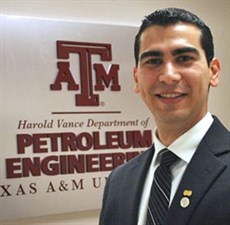 Ernesto Valbuena, a graduate of the Harold Vance Department of Petroleum Engineering at Texas A&M University, won first place in the Society of Petroleum Engineers (SPE) International Student Paper Contest doctoral division at the 2015 SPE Annual Technical Conference and Exhibition in Houston. The feat was achieved after a lengthy three-level competition and represents a great deal of work, both in communications and research.
Ernesto Valbuena, a graduate of the Harold Vance Department of Petroleum Engineering at Texas A&M University, won first place in the Society of Petroleum Engineers (SPE) International Student Paper Contest doctoral division at the 2015 SPE Annual Technical Conference and Exhibition in Houston. The feat was achieved after a lengthy three-level competition and represents a great deal of work, both in communications and research.
The purpose of the paper contest is to encourage petroleum engineering majors to conduct research, analyze it and present their findings in an oral report in front of panels of judges. The contest involves three successive competitions: local, regional and international. The local competition, held at Texas A&M in January 2015, had Valbuena competing against doctoral students in his own school. In the regionals, he faced the first and second place winners of all the universities in the Gulf Coast region and won first place. The first place winners of each region around the world then competed in the international competition. This is the second year in a row that a Ph.D. student from Texas A&M has won first place.
Valbuena’s research topic, “Forecasting Production Performance in Reservoir-Network Coupled Systems with Asphaltene Modeling,” concerned the development and implementation of a new integrated reservoir-network compositional simulator for the analysis of asphaltene deposits within tubing and production pipelines.
Asphaltenes are complex molecular structures present in most petroleum materials, including crude oil. These structures can precipitate and adhere to the insides of the pipes in a production system. This precipitation then solidifies and clogs the pipe, hampering efforts to produce oil from a reservoir. Since the increased thickness of asphaltene deposits could block up to 50 percent of a pipe’s diameter after only a few months of production, it is critical to predict the likelihood and extent of these deposits quickly and accurately.
His proposed combination of tight coupling with fully-implicit formulation for oil, gas and water flow in the reservoir and the pipe network, combined with his sequential approach for solid precipitation and deposition in the pipeline system, provides a better and more flexible methodology for analyzing additional types of solid deposits, too, such as hydrates and waxes. His approach also enables the evaluation of inhibitor injections and artificial gas lift installations to combat asphaltene deposits and how that would affect production performance.
Such integrated network modeling provides better reservoir performance forecasts than conventional stand-alone methods, as it allows the simulation of complex interactions between the reservoir and the surface facilities. Solids precipitation and deposition in networks have a negative impact on production rates, pressure management and field operations. Flow assurance techniques based on adequate estimates of potentially blocking phases are crucial to achieve good production performance. The modeling approach developed in Valbuena’s research allows for the forecasting of asphaltene precipitation and accumulation in pipelines under multiple types of production conditions, including pressure and temperature gradients, fluid composition, production rates, gas lift, and inhibitor injection.
Valbuena currently works for Chevron and provides support to business units for their offshore deepwater projects, executes testing of reservoir simulation models and designs and implements best practices for field development simulation models. It was while he was a graduate student at Texas A&M that he was able to hone his skills programming fully-implicit reservoir-network coupled compositional simulations and attacking the problem of asphaltene precipitations in pipelines. His advisors were Dr. Maria Barrufet and Dr. John Killough.
While a student at Texas A&M, Valbuena was also an active SPE student chapter officer. He continues to serve the society by chairing a section in the upcoming SPE Latin American and Caribbean Petroleum Engineering Conference (LACPEC) to be held in Quito, Ecuador.